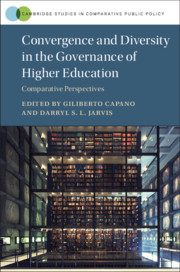Book contents
- Convergence and Diversity in the Governance of Higher Education
- Cambridge Studies in Comparative Public Policy
- Convergence and Diversity in the Governance of Higher Education
- Copyright page
- Dedication
- Contents
- Figures
- Tables
- Contributors
- Preface
- Abbreviations
- Part I Theorizing Governance in Higher Education
- Part II Systems, Processes, and Dynamics of Governance in Higher Education
- Part III Geographies of Governance
- 11 Higher Education Governance in North America
- 12 Governance Trends in European Higher Education
- 13 Governance and Corruption in East and Southeast Asian Higher Education
- 14 Fixing the System?
- 15 Neoliberals versus Post-Neoliberals in the Formation of Governance Regimes in Latin America’s Higher Education
- Index
- References
15 - Neoliberals versus Post-Neoliberals in the Formation of Governance Regimes in Latin America’s Higher Education
from Part III - Geographies of Governance
Published online by Cambridge University Press: 21 November 2020
- Convergence and Diversity in the Governance of Higher Education
- Cambridge Studies in Comparative Public Policy
- Convergence and Diversity in the Governance of Higher Education
- Copyright page
- Dedication
- Contents
- Figures
- Tables
- Contributors
- Preface
- Abbreviations
- Part I Theorizing Governance in Higher Education
- Part II Systems, Processes, and Dynamics of Governance in Higher Education
- Part III Geographies of Governance
- 11 Higher Education Governance in North America
- 12 Governance Trends in European Higher Education
- 13 Governance and Corruption in East and Southeast Asian Higher Education
- 14 Fixing the System?
- 15 Neoliberals versus Post-Neoliberals in the Formation of Governance Regimes in Latin America’s Higher Education
- Index
- References
Summary
Increasing enrollment in higher education and improving its financing and quality are goals that the governments of Latin America share. However, the policies adopted to reach these objectives vary from nation to nation. During the past decade, various scholars have explained such differences based on the ideological profile of regional governments. This chapter, however, shows that no linear relationship exists between the political orientation of Latin American governments and their policies of higher education. The argument is that differences are the result of an accumulated process of hybridization generated by governance regimes. The characteristics of such regimes are combinations of public policy instruments, the role of actors involved in the political arena, and the degree of compliance with the systemic objectives that governments establish. By analysing the diachronic evolution of higher education policies in fifteen Latin American countries, the chapter identifies three types of governance regimes: a) private integration, b) dual governance, and c) loose governance.
- Type
- Chapter
- Information
- Convergence and Diversity in the Governance of Higher EducationComparative Perspectives, pp. 426 - 454Publisher: Cambridge University PressPrint publication year: 2020

